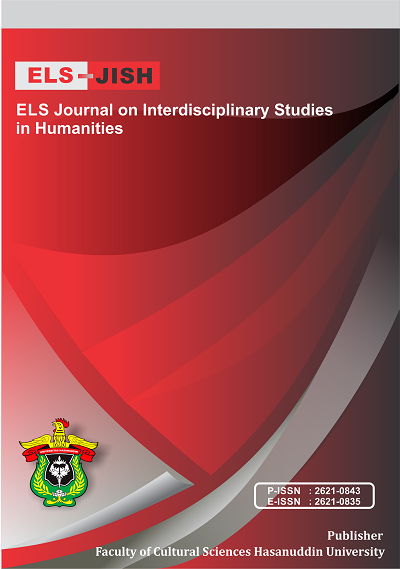Familiarizing Students with a Friendly Learning Activity in Enriching English Vocabulary: Memorization Technique
DOI:
https://doi.org/10.34050/elsjish.v6i2.24089Keywords:
Learning English, Memorization Technique, Positive Impact, VocabularyAbstract
In learning English, we must apply appropriate technique to mastery it. One of the technique used is memorizing vocabulary. The more vocabulary we memorize, the easier it will be for us to use the language in communicating. But not only memorization technique can improve our language learning but there are still many methods that we can use depending on how the learning or learning model is suitable for those learners. But in fact, based on the observations of researchers at SMP Negeri 2 Parepare, researchers found several problems in students' vocabulary mastery. One of the problems is the students still do not know various kinds of vocabulary such as adjectives, nouns, verbs and adverb, and how to arrange them in a sentence. In this study, the researchers applied a mixed method with a one group class pretest and posttest design. The researchers took one class as a sample where the number of students was thirty students. The results of data analysis showed that the memorization technique provided positive impacts on students’ English vocabulary. This is evidenced by the N-Gain test that aimed to see the effect of the treatment given, showing that there are four students in the high category, there are nineteen students in the currently/medium category, and there are seventeen students in the low category. In addition, the most of students responded memorization technique positively. It can be said that through the memorization technique, it can improve the vocabulary mastery of students at SMP Negeri 2 Parepare.
References
Agustiono, R., & Rizal, S. (2021). Improving Student’s Vocabulary Mastery Through Memorizing Multi Senses Technique. Jadila: Journal of Development and Innovation in Language and Literature Education, 2(3), 365-373. http://Ejournal.Karinosseff.Org/Index.Php/Jadila/Article/Download/201/202
Andini, C., Yassi, A. H., Sukmawaty. (2021). The Use of Honorifics in English and Buginese with special Reference to Bone Language: A Comparative Study. International Journal of Innovative Science and Research Technology, 6(7), 873-877.
Andini, C., Sosrohadi, S., Fairuz, F., Dalyan, M., Rahman, F. F., & Hasnia, H. (2022). The Study of Japanese Women in the Facial Treatment Advertisement: A Semiotics Perspective of Pierce’s Theory. ELS Journal on Interdisciplinary Studies in Humanities, 5(2), 337-347.
Bahri, S. Y. A. M. S. U. L. (2021). Improving students’ vocabulary achievement through the word memorisation method using handbook in MAN 2 POSO. Unpublished Undergraduate Thesis). Retrieved on October, 20, 2020. https://Digilibadmin.Unismuh.Ac.Id/Upload/13377-Full_Text.Pdf.
Hasnia, H., Andini, C., Tahir, M. D., Hunaeni, H., Zulfikariandi, Z., & Muslimin, M. T. (2022). The Ability of 1st Class Students of SMAN 11 Enrekang to Arrange Verbal and Nominal Sentences. ELS Journal on Interdisciplinary Studies in Humanities, 5(3), 539-550.
Hasibuan, A. A. (2017). Improving the Students’ Vocabulary Mastery through Word Square Method at Seven Grade of State Islamic Junior High School Sibuhuan (Doctoral dissertation, Universitas Islam Negeri Sumatera Utara). Http://Repository.Uinsu.Ac.Id/2678/1/Cover%20.Pdf
Kuswana, W. S. (2011). Taxonomy of Thinking. Bandung: Rosdakarya Youth.
Lee, O., & Stephens, A. (2020). English learners in STEM subjects: Contemporary views on STEM subjects and language with English learners. Educational researcher, 49(6), 426-432.
Manoppo, E. C., Rares, H., & Posumah, J. (2021). IMPROVING STUDENTS’VOCABULARY BY USING MIMICRY MEMORIZATION METHOD. Journal of English Language and Literature Teaching, 5(2). http://Ejournal.Unima.Ac.Id/Index.Php/Jellt/Article/View/2457.
Purnama, H. M. (2021). A Semiotic Analysis of Hala Movie (Doctoral dissertation, UIN RADEN INTAN LAMPUNG).
Rahman, F., & Weda, S. (2019). Linguistic deviation and the rhetoric figures in Shakespeare’s selected plays. XLinguage" European Scientific Language Journal", 12(1), 37-52.
Riski, H., Rahman, F., & Sadik, A. (2018). Improving the Students’Speaking Ability Through Silent Way Method at SMU Negeri 12 Makassar. Jurnal Ilmu Budaya, 6(2), 303-312.
Said, M. M., Rita, F., Weda, S., & Rahman, F. (2021). English Language Performance Development Through Extracurricular Activities at Faculty of Teacher Training And Education Tadulako University Palu. PalArch's Journal of Archaeology of Egypt/Egyptology, 18(08), 388-403.
Sianturi, F. G. (2021). Using Word Square Technique to Improve Students'Vocabulary Mastery to the Eighth Grade Students of SMP Methodist 1 Palembang (Doctoral dissertation, 021008 Universitas Tridinanti Palembang).
Simamora, M. W. B., & Oktaviani, L. (2020). What is your favorite movie?: a strategy of English Education students to improve english vocabulary. Journal of English Language Teaching and Learning, 1(2), 44-49.
Sugiyono. (2017). Educational research methods quantitative, qualitative, and R&D Approaches. Bandung: Alphabeta.
Sukmawaty, Rahman, F. F., & Andini, C. (2022). Covid-19 Pandemic and Axiology of Communication: A Study of Linguistic Phenomena. IJISRT, 7(4), 1079-1087.
Tahir, D., Rahman, F., & Rahman, A. (2018). The Study of Buginese Reciprocal Verb in the Boegineesche Chrestomathies Manuscript. Am. J. Humanit. Soc. Sci. Res, 2(08), 48-54.
Weda, S., Atmowardoyo, H., Rahman, F., & Sakti, A. E. F. (2021). Linguistic aspects in intercultural communication (IC) practices at a higher education institution in Indonesia. Eroupean Language Scientific Journal, 14, 2-6.
Downloads
Published
How to Cite
Issue
Section
License
Copyright (c) 2023 Khadijah Maming, Amir Patintingan, Sianna, Delfiana

This work is licensed under a Creative Commons Attribution-ShareAlike 4.0 International License.






